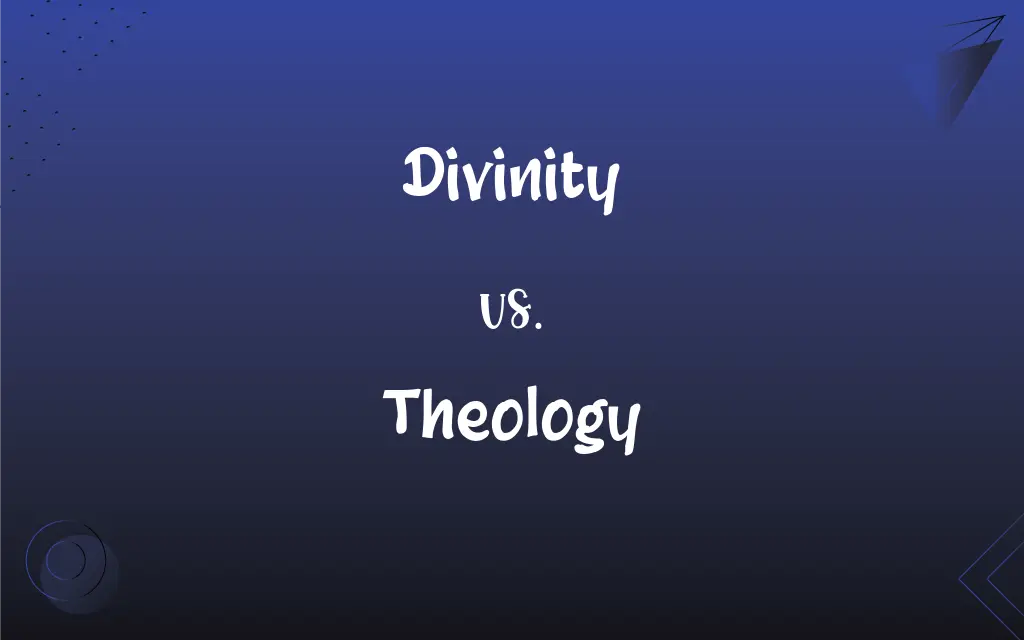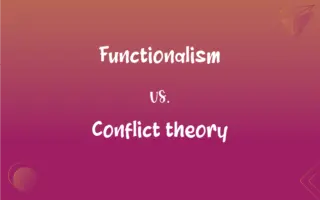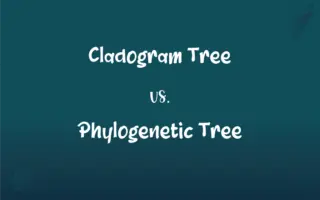Divinity vs. Theology: What's the Difference?
Edited by Janet White || By Harlon Moss || Updated on October 25, 2023
Divinity refers to the state or quality of being divine, while theology is the study of religious beliefs and the nature of the divine.

Key Differences
Divinity represents the nature or essence of the divine, typically referring to deities or gods. Theology, on the other hand, is an academic and systematic pursuit, delving into the understanding and exploration of religious phenomena, doctrines, and the divine.
Divinity can encompass the characteristics and powers associated with gods, such as omnipotence or benevolence. Theology analyzes these characteristics, debates them, and seeks to understand them within a broader religious framework.
Divinity might be experienced or felt, becoming an intrinsic part of someone's spiritual or religious life. Theology attempts to articulate these experiences, categorizing and analyzing them for greater understanding.
A person might claim to have a personal encounter with divinity through a mystical experience. Theology would take that experience and place it within the context of religious texts, traditions, and interpretations.
While divinity might be seen as more abstract, a transcendent quality or essence, theology is tangible, present in religious texts, scholarly articles, and academic discussions, always seeking to understand the nature of divinity in a deeper way.
ADVERTISEMENT
Comparison Chart
Nature
Abstract quality or state of being divine
Academic and systematic study
Purpose
Reflects the essence or characteristics of the divine
Seeks to understand, explain, and interpret religious phenomena
Engagement
Can be experiential, personal
Analytical, scholarly
Presence in literature
Often found in poetry, hymns, and devotional texts
Found in religious studies, academic papers, and theological texts
Application
Pertains to one's spiritual or religious experience or belief
Involves academic discussions, debates, and structured analysis
ADVERTISEMENT
Divinity and Theology Definitions
Divinity
The state of being divine or godlike.
The divinity of the universe is evident in its vastness.
Theology
The study of religious beliefs and the nature of God.
Theology can be both a personal journey and an academic pursuit.
Divinity
Divine character or nature.
His selfless acts showed a touch of divinity in him.
Theology
The study of religious experiences, practices, and effects.
Theology goes beyond texts, exploring the lived experiences of believers.
Divinity
A deity or god.
In ancient cultures, there were numerous divinities for various aspects of life.
Theology
The field of study and analysis of divine things or religious practices.
Many renowned philosophers have dipped their toes into theology.
Divinity
A study or theology course in a university or seminary.
She pursued her Masters in Divinity at a renowned institution.
Theology
A system or form of religious beliefs.
Christian theology differs from that of other religions.
Divinity
A type of confectionery or candy.
The divinity candy melted in my mouth with its sweet, airy texture.
Theology
Religious theory when systematically developed.
His writings on angelology became a crucial part of medieval theology.
Divinity
The state or quality of being divine.
Theology
The study of the nature of God and religious truth; rational inquiry into religious questions.
FAQs
Do all religions have the same perspective on divinity?
No, the concept of divinity varies across religions and cultures.
Can someone study divinity in school?
Yes, many institutions offer courses or degrees in Divinity, which is a subset of theology.
What is the core difference between divinity and theology?
Divinity refers to the state or quality of being divine, while theology is the study of religious beliefs and the nature of the divine.
Is theology limited to Christianity?
No, theology can pertain to the study of any religion's beliefs and practices.
Can a person have a personal experience with divinity?
Yes, many individuals claim to have personal spiritual or mystical experiences related to divinity.
Can one practice theology outside of religious institutions?
Yes, theology can be pursued in academic settings, personal studies, or even informal discussions.
Are there different branches of theology?
Yes, theology has various branches like moral theology, systematic theology, and comparative theology, among others.
Is the concept of divinity static across time and cultures?
No, the concept of divinity is dynamic, evolving with cultural, historical, and individual influences.
Can divinity also refer to a type of candy?
Yes, divinity is also a name for a sweet confectionery or candy.
How do theologians approach divinity in their studies?
Theologians analyze, debate, and seek to understand divinity within a broader religious framework.
How has the study of theology evolved over time?
Theology has evolved with societal, cultural, and historical changes, leading to new interpretations and understandings of divinity.
How do different religions view the relationship between divinity and humanity?
Theologies across religions vary, leading to diverse perspectives on the relationship between divinity and humanity.
Does everyone's understanding of divinity align with theological teachings?
Individual experiences and beliefs about divinity might differ from established theological teachings.
Can divinity be considered an academic field like theology?
While divinity touches upon academic areas, it's more abstract and experiential, whereas theology is a systematic academic study.
What's the role of divinity in religious practices?
Divinity is often the focus or subject of religious practices, rituals, and devotions.
How do modern debates in theology impact perceptions of divinity?
Contemporary theological debates can reshape or refine understandings of divinity, making it more relatable to modern contexts.
Can someone believe in divinity without adhering to a specific theology?
Yes, an individual can have a belief or experience of the divine independent of structured religious beliefs or theology.
Are divinity and theology concepts exclusive to monotheistic religions?
No, both concepts can be found in monotheistic, polytheistic, and non-theistic religious traditions.
Can theology include the study of religious rituals?
Yes, theology can encompass the study of beliefs, practices, rituals, and more.
Is theology always based on religious texts?
While religious texts are foundational in theology, it also encompasses traditions, interpretations, and lived experiences.
About Author
Written by
Harlon MossHarlon is a seasoned quality moderator and accomplished content writer for Difference Wiki. An alumnus of the prestigious University of California, he earned his degree in Computer Science. Leveraging his academic background, Harlon brings a meticulous and informed perspective to his work, ensuring content accuracy and excellence.
Edited by
Janet WhiteJanet White has been an esteemed writer and blogger for Difference Wiki. Holding a Master's degree in Science and Medical Journalism from the prestigious Boston University, she has consistently demonstrated her expertise and passion for her field. When she's not immersed in her work, Janet relishes her time exercising, delving into a good book, and cherishing moments with friends and family.































































